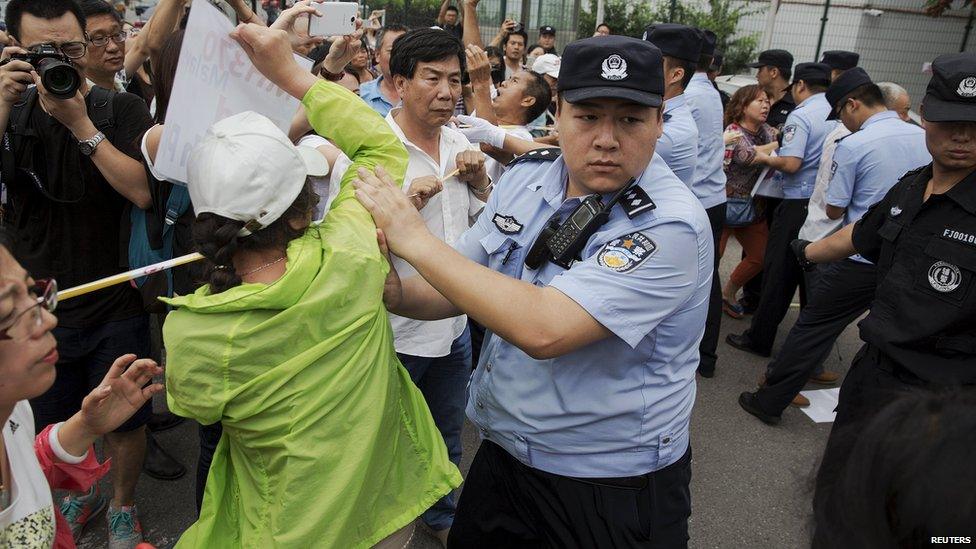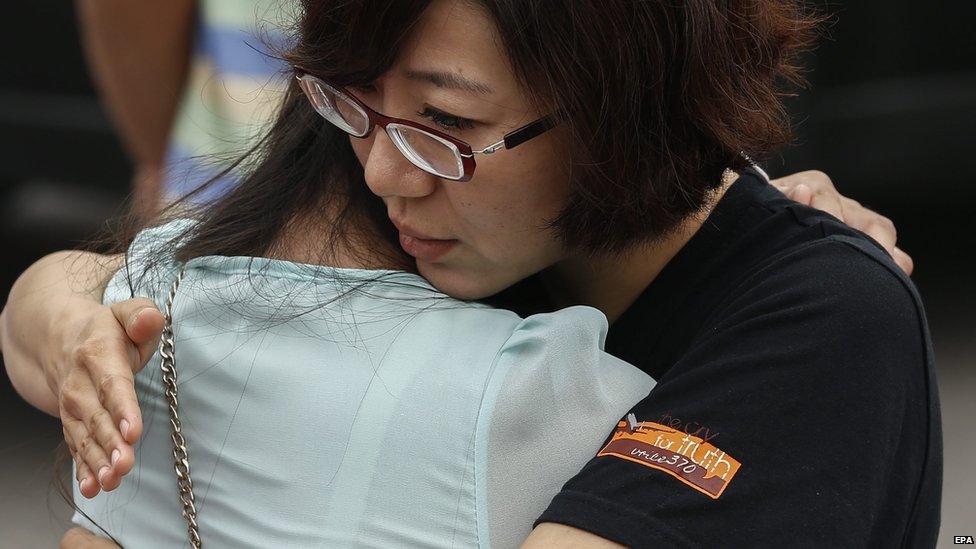MH370 relatives still searching for answers
- Published
The BBC's John Sudworth joined MH370 relatives in Beijing who were angry that reporters were denied access to meeting
For the best part of a day we have followed Chinese relatives around the streets of Beijing, defiant and determined to make their point that they do not accept the conclusion that the plane is lost.
First they gathered at an office near the airport where they were due to meet an official from Malaysian Airlines for one of their regular, two-monthly briefings.
After being denied permission to bring the media with them to that meeting, they marched on.
Next stop, the Malaysian Embassy, where there were a few scuffles and skirmishes with the police before they were eventually allowed to hold a protest at the gates.
And then, after that proved fruitless, they headed off shouting and chanting for truth and justice to the Malaysian ambassador's residence, where they set about punching and kicking the gates.
They were quickly hustled away by the police with the promise of a meeting with a Malaysian government representative, so in the end, perhaps, there was a victory of sorts.

Families of MH370 victims held a protest at the Malaysian Embassy
But it is, you can't help but conclude, a very sorry sight.
Seventeen months after the loss of their close family members, they've been reduced to a small, despairing band of protesters.
Today, they at least managed to make their point in front of the foreign media although some muttered quietly of constant control and harassment by China's plain-clothed police.
It is a treatment normally reserved for those perceived as a political nuisance rather than the bereaved family members of the victims of an air disaster.
But then, that is, arguably what they have indeed become.
Around 30-strong, they do not, of course, represent all of the 153 Chinese passengers on board MH370.

Scuffles broke out as the families were prevented from reaching the embassy
But it is still a sizeable sample and they are united by that one, abiding belief; that they have not been given the truth by the Malaysian authorities.
Their biggest fear is that they are being duped.
The discovery of the wing part on the island of Reunion is, in their view, perhaps a convenient device to help draw a line under the whole affair without the plane, or the bodies, ever being produced.
On one level, you could argue, it is simply a refusal by the grief-stricken to accept the obvious.
The evidence after all is strong; the satellite data shows the flight ended in the southern Indian Ocean and now that debris find - matching the sea current patterns - does indeed seem to add further corroboration.
But the unwillingness of many of the Chinese relatives to believe is not as illogical as it sounds.

The families fear they have not been told the whole truth about what happened to flight MH370
There are indeed real question marks over the way the Malaysian authorities have handled both the search for the plane and the release of information - marred by delay, confusion and apparent self-interest.
And here in China too, the families feel there is no-one they can trust.
There are no independent media voices campaigning on their behalf or doggedly pursuing the truth.
Their own attempts to demand answers here in Beijing, as we saw today, are falling on deaf ears.
Bewildered and despairing, it is perhaps little wonder that some find comfort in the myriad conspiracy theories swirling online: that the plane might not be at the bottom of the ocean and that their loved ones might still be alive.